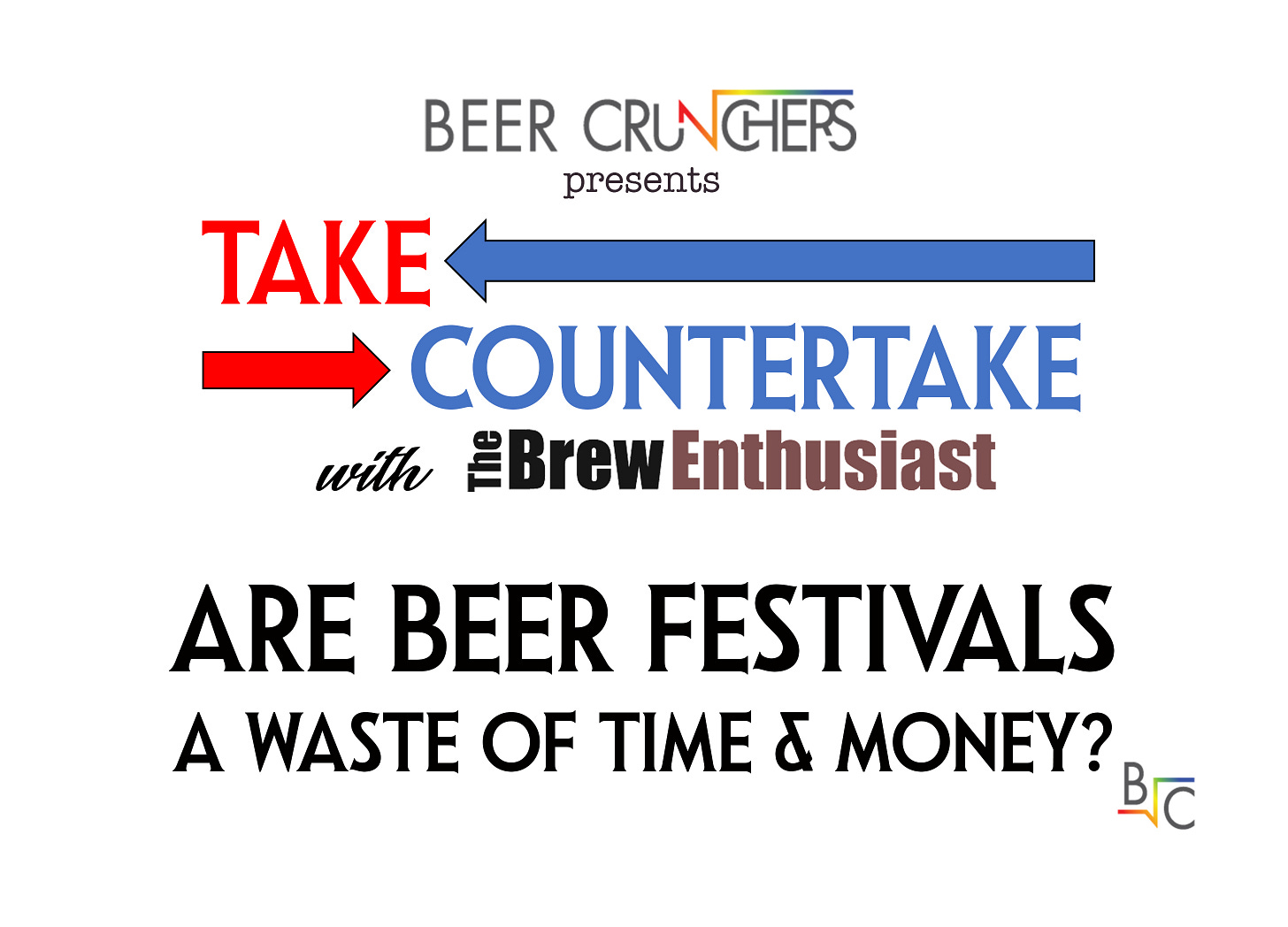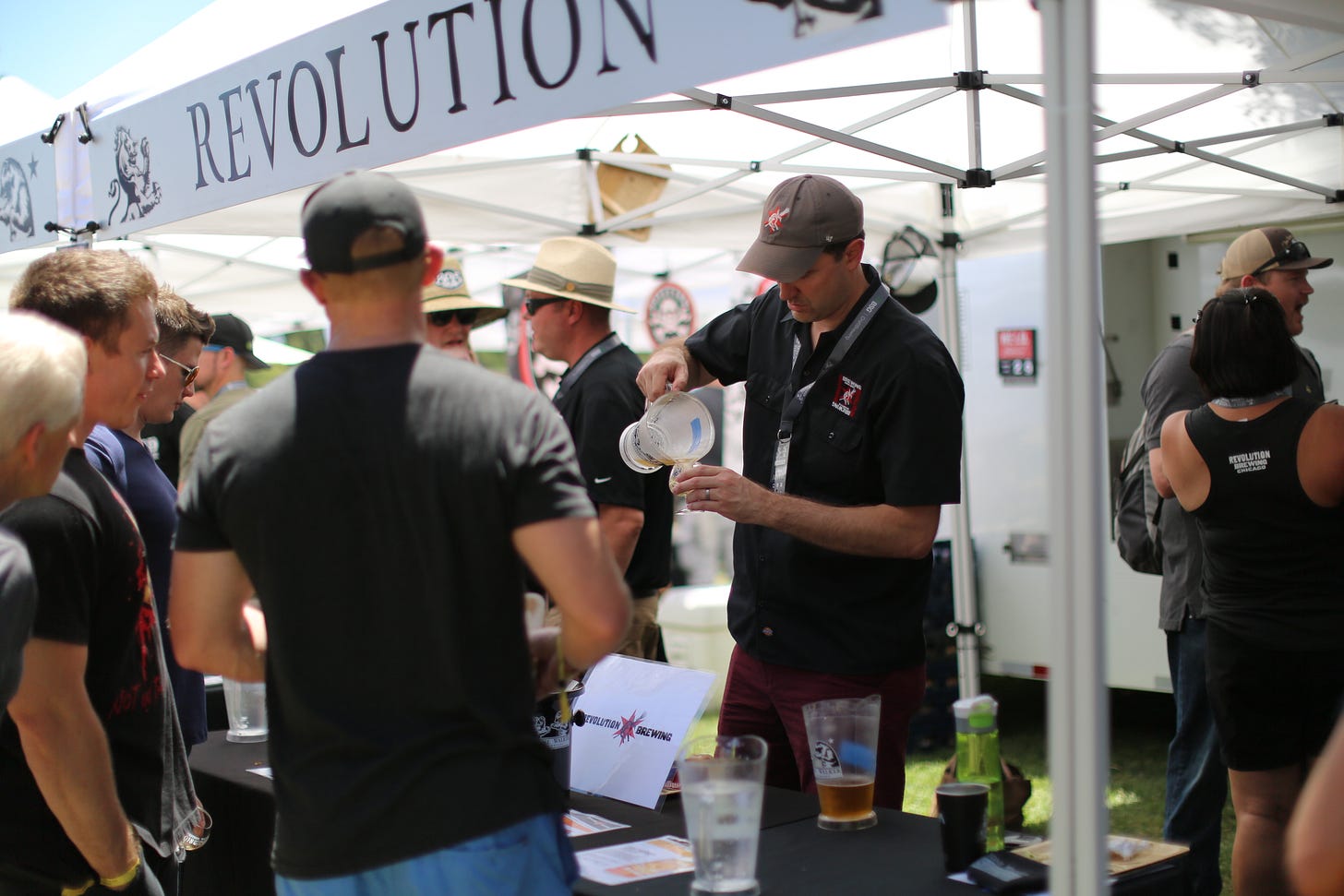Back in August, a new format called Take, Countertake debuted where my dear friend and beer marketing expert Chris McClellan (@brewenthusiast) chose a hill a die on. This is a regular schtick of his on Twitter, but he brought his talents to Beer Crunchers for a deeper debate, beginning with his stance that custom tap handles are a waste of money. Chris is back and has chosen a new hill, this time regarding his feelings toward beer festivals for breweries and enthusiasts alike. I’m once again going to take the countertake to his takes 🔥
CHRIS’ Take: Beer Festivals are an expensive and complicated way to get more drunk than you need to be
How much does a festival ticket cost? $50? $75? For what? 3-4 hours of drinking? I live in NYC and I would love to see you try to spend $75 at a local bar/brewery drinking beer for the afternoon, even in 2023. If you live Chicago, and the pints are about $2 less on average, then it's the bargain of the century! If the mode is "let's get drunk", then I've got an excellent solution: Grab a couple tasty 4 packs, bring them to your friend's backyard, fire up the grill, and plant yourself down in a lawn chair for the afternoon with 5 of your buddies. It'll be much more fun, cheaper, more intimate, easier to urinate, more relaxed, less drunk assholes, etc, etc... I could go on for hours. It's a superior experience. Most of the people that go to most beer festivals aren't there for a tremendous sampling opportunity that it represents - they go to get drunk, and that's just not nearly as fun.
DOUG’s Countertake: Who Says We Have to Choose?
If it was our final day on earth, then I would agree with Chris’ recommendation of heading to a bar or a friends backyard instead of a beer festival. Thankfully though, both choices can co-exist. Beer festivals are an enticing option for budding beer enthusiasts still trying to figure out what they like, as well as hyper-engaged fans interested in what’s new, or elite. Making progress at a bar can be a costly, limiting, inefficient, and when you’re in discovery mode, it’s not nearly the event.
Festivals absolutely can cost $50-75 (or more) like Chris suggests, but so do most big outings these days. In exchange, beer geeks are immersed in a sea of options to taste and sample in a short period of time, like the Bonus Level of a video game. Chris’ portrayal paints the darkest picture of the last 30 minutes of a fest where yes, 1 out of 100 people may have turned into a sloppy liability. I’ve been to countless festivals, many this year, and never found drunk people to disrupt my enjoyment of the day. I was surrounded by mostly coherent people taking their time, who were jazzed to talk beer and sample.
CHRIS’ Take: You cannot possibly "appreciate" sampling that many beers in one session. Your palate is numb after 20 mins. (Chris)
As mentioned above, the espoused value prop of beer festivals is that you can try the latest and greatest from a large selection of breweries all at once, and on paper, this sounds great! But it's not great, and it often doesn't pan out like that. Often, the breweries in question will just bring their flagship products. I know what Victory Prima Pils taste like. I also know what Allagash White tastes like. Couple that with the simple fact that it's impossible to appreciate the nuance of every beer you try when you've had 30 samples and you forgot about the first 15 you had anyway...and it becomes a "resistance is futile" sort of experience, where you follow the most energetic person in your group from table to table until you don't give a shit anymore. It's exhausting, and the main value prop is lost in a sea of pretzel necklaces and raspberry vanilla milkshake doppelbocks.
DOUG’s Countertake: All Festival-Goers are Not the Same
If a brewery is pouring two choices at a festival, they should absolutely bring an approachable year round or seasonal beer, in addition to something more adventurous. When I was pouring at Barrel & Flow in Pittsburgh this past August, I brought our Freedom Lemonade and Cuvée de Grâce, a 4.5% ABV Session Sour and a nearly 16% ABV behemoth. Some attendees would approach knowing exactly what they wanted and others would say “what do you got?” So I would try different approaches, for example “Well if you’re parched and looking to be refreshed, we’ve got this light, approachable sour built to remind you of old fashioned lemonade. Then if you’re looking for that complex, powerful dessert, with major fire power behind it, you might prefer the Cuvée.”
It was an even split of which way guests would lean, because beer festivals bring a diverse range of beer fans. Chris has the vision that everyone is looking to get blasted and in 2023 especially with restraint being a major trend, that’s just not true. There’s certainly tickers only looking for something rare, and then there’s young couples on a date taking it easy who would be thrilled to have a small pour of Allagash White with the chance to ask a few questions or gush over their love of the beer. Personally, I don’t like to assume that everyone has discovered White or Prima Pils yet, because there’s a decades worth of young people in their 20s who simply haven’t.
Beer festivals aren’t catering to Haze Deniers™ burnt out from working in the industry for over a decade. They are a right of passage for some, or an annual / semi-annual outing for those in their early and prime years of beer enthusiasm who want to be around a lot of people. Really they’re a big party and unlike crotchety Chris and I who are 40+ with kids, people like to party.
CHRIS’ Take: They're not a good sampling opportunity for breweries. They're just... not. (Chris)
You might think I'm wrong here, and you're perfectly within your rights to feel that way, but I'm not wrong. Beer Festivals are generic and unfocused, and that means that you have to work extraordinarily hard as a brewery or brand to stand out when there are 30 other suppliers present, and even then... what are you actually doing? You can drive better "brand awareness" at a pint night at a local beer bar without spending money sending your sales rep to god-knows-where Minnesota to stand in a field for 4 hours, then go to a hotel, spend money on meals, etc.
The incremental costs are enormous. Are you trying to collect emails for your marketing team? Are you trying to drive awareness of a new seasonal beer you just released? How likely are the customers to actually remember your beer enough to buy it at the store... if you've even got distribution at that store? What if you're small and you just want them to visit your taproom, restaurant, etc? The actionable things a customer can do from your presence at a beer festival is remarkably thin, and thus your efforts will almost always be better spent making great beer and finding your customers elsewhere.
DOUG’s Countertake: You’re Right They’re Not, if the Brewery Mails it in (Doug)
Beer fans love a little personal attention, including the chance to talk to someone “in the know”. That brewery worker has the opportunity to not only convert a successful interaction into a 4-pack sale in the market, but they could make a lifelong fan. I agree with Chris that if volunteers are pouring your beer, you’re not going to convert shit. And similarly, if a hung over brand ambassador with no deep knowledge of the brewery’s happenings is pouring the beer, that has the ability to do more damage than good. But if people who give a damn are able to set up a beer to connect with the consumers brain waves in advance of tasting, provide the background to make this particular sample more memorable than any others that day, then they could have just made a customer for life. This annuity doesn’t just lead to loyal beer purchasing on a regular basis, but these fans share with friends, and tell them about you. That’s how it’s done.
Breaking It Down - Final Thoughts
CHRIS:
There are great examples of brewery-run invitationals and state-run events at conferences that are both fun and value-added, so I'm not all doom and gloom here on beer festivals. But they're relatively few and far between, and my suggestion to the beer drinker looking for the perfect beer drinking experience is simple: Skip the festival, head to the pub, have a few pints of something new, and get home at a reasonable hour without the sunburn and with about $50 in your pocket.
Doug:
The reason there are great festivals, as Chris points out, is because there are festivals that aren’t still just trying to copy + paste the 2013 blue print. The beer industry has changed a lot, COVID changed what we value, the stakes have been raised, the newest generation is behaving differently, the biggest swath of craft beer fans is older, and major communities & demographics are still be neglected.
Beer festivals who understand this and build around those narratives have a chance to build the perfect beer festival. The ones who don’t will go by the wayside, if they haven’t already. But to Chris’ point, breweries should be weighing not only the full costs of participating, but the quality of training that the individual pouring has. Make sure they’re well-equipped to speak to the beers, the latest happenings at the brewery, and motivated to win the brewery new customers for life.
So who won the debate? Let us know









I"m going with Chris on this one. In nearly twenty years of having a brewery booth at festivals, I don't see the cost in time, staff, and money nearly worth the minor impact on the consumers. Staff likes to do ones where they sent away so its like a paid vacation with PTO during the following week. When I work them, I have fun for a bit and then the mass market of people there are just coming up asking for "What's new?" or "what's got the most alcohol?" As a brewery that makes classic sessionable beers, we become a pitstop on the way to the next imperial stout. Wish it was otherwise but we'll be ending our involvement in most festivals in 2024. Cheers!
I’ve worked many Beer Festivals. Can’t remember where I heard it, but I was told a beer festival is like fishing with a Rod & Reel. The goal is to catch & convert a few quality ‘fish’.
I think Chris has been fishing with a net for too long, as a Marketing guy. He’s forgetting that beer is still about making a personal connection. How do you measure that?